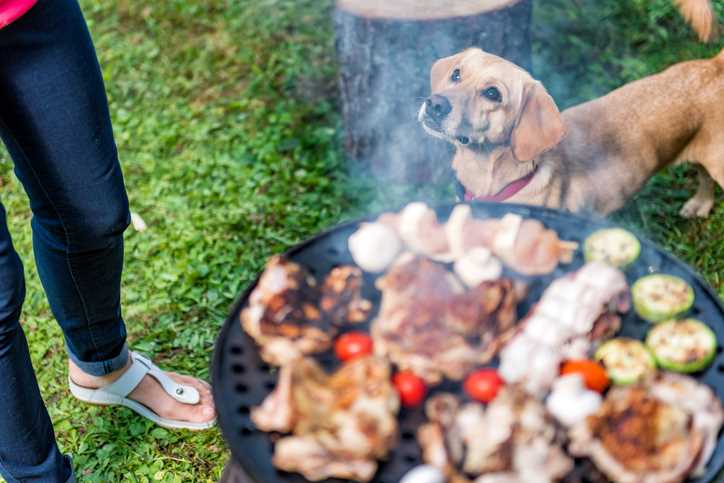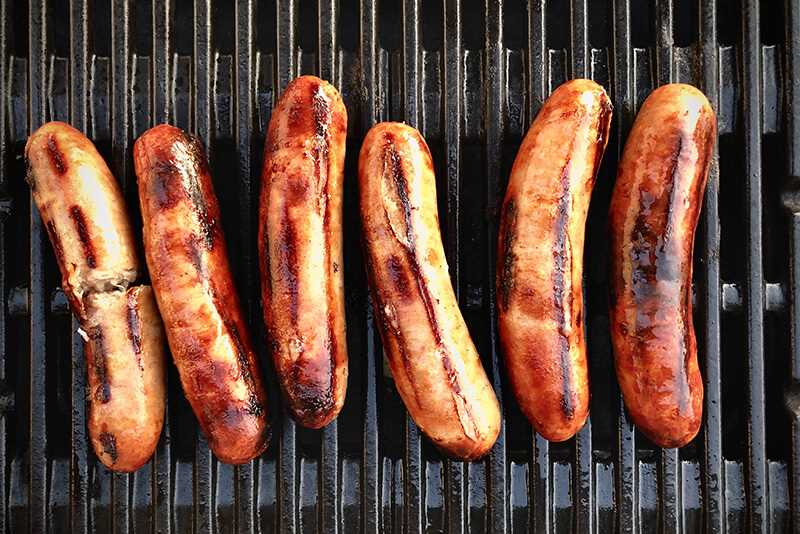



It is important to know which human food is safe for dogs to eat and which is not. One common question pet owners often ask is whether dogs can eat cooked sausages. While sausages may seem like a tasty treat for our furry friends, there are a few things dog owners should consider before sharing this type of food with their pets.
Dogs have different nutritional needs than humans, and certain foods that are safe for us can be harmful or even toxic to dogs. Cooked sausages can contain high levels of salt, spices, preservatives, and other ingredients that are not healthy for dogs. Additionally, sausages often contain a high fat content, which can lead to digestive issues and pancreatitis in dogs.
Sausages can also pose a choking hazard for dogs, especially when they are swallowed whole or when dogs try to bite off large pieces. The casing of the sausage can cause blockages in their digestive system, which may require medical intervention.
If you really want to treat your dog with sausages, it is vital to choose a dog-friendly sausage option. Look for sausages that are specifically made for dogs or are labeled as “all-natural” or “organic.” These sausages are usually made with high-quality ingredients that are safe for dogs to consume. However, it is still crucial to feed sausages in moderation as an occasional treat, rather than a regular part of your dog’s diet.
In conclusion, while cooked sausages may be tempting to share with your furry friend, it is best to avoid feeding them to dogs. These sausages can contain harmful ingredients, high levels of salt and fat, and can pose a choking hazard. Instead, opt for dog-friendly sausages made with safe ingredients, and always feed them in moderation.
Are cooked sausages safe for dogs?
Many dog owners may be tempted to give their furry friends a taste of cooked sausages, but it’s important to consider whether it’s safe for dogs to consume this popular human food.
While dogs can technically eat cooked sausages, it’s not recommended as a regular part of their diet. Cooked sausages are often high in fat, sodium, and spices, which can cause digestive issues, pancreatitis, and obesity in dogs.
The high fat content in cooked sausages can be difficult for dogs to digest and may lead to stomach upset, diarrhea, or even a life-threatening condition called pancreatitis. Additionally, the high sodium content in sausages can be harmful to dogs, as it can lead to dehydration and kidney problems.
Moreover, sausages are often seasoned with spices such as garlic and onion, which are toxic to dogs in large quantities. These spices can damage a dog’s red blood cells and cause anemia.
If you still want to give your dog a small amount of cooked sausage as an occasional treat, it’s important to choose a low-fat, low-sodium variety that doesn’t contain any spices that are toxic to dogs. It’s best to consult with your veterinarian to determine if it’s safe for your individual dog and to get recommendations on appropriate portion sizes.
Overall, it’s always better to stick to a balanced and nutritionally complete diet specifically formulated for dogs. This will ensure that they receive all the necessary nutrients without any potential risks associated with human foods like cooked sausages.
Potential risks of feeding cooked sausages to dogs
While dogs may enjoy the taste of cooked sausages, there are potential risks associated with feeding them this food. It is important for dog owners to be aware of these risks and make informed decisions about what to feed their pets.
Digestive Issues
Cooked sausages are often high in fat and salt, which can be difficult for dogs to digest. Consuming too much fat can lead to an upset stomach, diarrhea, and potentially pancreatitis. Salt, on the other hand, can cause an electrolyte imbalance and lead to dehydration.
Bones and choking hazards
Some sausages may contain bones or bone fragments, which can pose a choking hazard and cause internal injuries if swallowed. These bones can splinter and cause obstructions or tears in the digestive tract, potentially requiring surgical intervention.
| Potential Risks | Consequences |
|---|---|
| Digestive Issues | Upset stomach, diarrhea, pancreatitis, electrolyte imbalance, dehydration |
| Bones and choking hazards | Choking, internal injuries, digestive tract obstructions, tears |
It is important to note that sausages often contain additional ingredients, such as spices, garlic, and onion, which can be toxic to dogs. These ingredients can cause damage to the dog’s red blood cells and potentially lead to anemia.
If you want to treat your dog to sausage, it is best to choose specially-made dog sausages that are specifically formulated for their dietary needs. These sausages are usually low in fat, salt, and other harmful ingredients.
Always consult with a veterinarian before introducing new foods into your dog’s diet to ensure their health and safety.
Recommended alternatives to cooked sausages for dogs
While cooked sausages may be a tasty treat for humans, they are not recommended for dogs due to their high fat and salt content. However, there are several alternatives that are safe and healthy for dogs to enjoy.
1. Lean meats:
Lean cuts of cooked chicken, turkey, or beef can be a great alternative to sausages. Remove any excess fat and seasoning before feeding it to your dog. These meats are a good source of protein and can be served in small, bite-sized pieces.
2. Vegetables:
Steamed or cooked vegetables like carrots, green beans, and broccoli can provide dogs with essential nutrients and make a tasty snack. Make sure to cut them into small, manageable pieces to avoid choking hazards. Avoid feeding onions, garlic, or avocados as these can be toxic to dogs.
3. Dog-approved treats:
Opt for specially made dog treats that are specifically designed for your furry friend. These treats are often formulated to meet your dog’s nutritional needs and are available in a variety of flavors and textures. Look for treats that are low in fat and salt and free from any harmful ingredients.
| Food | Can dogs eat it? |
|---|---|
| Cooked Sausages | No |
| Lean meats (chicken, turkey, beef) | Yes, remove excess fat |
| Steamed vegetables (carrots, green beans, broccoli) | Yes, in small pieces |
| Dog-approved treats | Yes, choose low-fat and salt-free options |
Remember, it’s always important to consult with your veterinarian before making any changes to your dog’s diet. They can provide you with individualized recommendations based on your dog’s specific needs and health conditions.
Tips for Safely Feeding Sausages to Dogs
While sausages can be a tasty treat for dogs, it’s important to feed them safely. Here are some tips to keep in mind:
1. Choose the Right Sausage
Not all sausages are safe for dogs to eat. Avoid sausages that contain ingredients such as onion, garlic, or spices, as these can be harmful to dogs. Opt for plain and unseasoned sausages.
2. Cook the Sausage Thoroughly

Always make sure the sausage is cooked thoroughly before giving it to your dog. Raw or undercooked sausage can contain harmful bacteria that may cause digestive issues or even food poisoning.
3. Cut the Sausage into Small Pieces
For easier digestion and to prevent choking hazards, it’s best to cut the sausage into small, bite-sized pieces. This will also help in portion control and prevent your dog from consuming too much sausage at once.
4. Serve in Moderation
Sausages should be given to dogs as an occasional treat rather than a regular part of their diet. They are usually high in fat and can lead to weight gain and other health issues if given excessively.
5. Watch for Allergic Reactions

Some dogs may have allergies or sensitivities to certain ingredients in sausages. Monitor your dog closely after feeding them sausage for any signs of an allergic reaction, such as itching, vomiting, or diarrhea.
Remember, it’s always best to consult with your veterinarian before introducing any new types of food to your dog’s diet, including sausages. They can provide specific guidance based on your dog’s individual needs and health condition.
Question-answer
Is it safe for dogs to eat cooked sausages?
No, it is generally not safe for dogs to eat cooked sausages. Cooked sausages can contain ingredients such as spices, garlic, onions, and preservatives that are harmful to dogs. The high salt and fat content in sausages can also cause digestive issues and pancreatitis in dogs.
What are the potential risks of feeding cooked sausages to dogs?
Feeding cooked sausages to dogs can pose several risks. The spices, garlic, onions, and preservatives commonly found in sausages can be toxic to dogs and may cause digestive problems or even organ damage. The high salt and fat content in sausages can lead to dehydration, pancreatitis, obesity, and other health issues in dogs.
Can dogs have a small amount of cooked sausages?
No, it is not recommended to give dogs any amount of cooked sausages. Even a small amount can contain harmful ingredients and high levels of salt and fat which can be detrimental to a dog’s health. It’s best to stick to a balanced and appropriate diet for your furry friend.
What are the alternatives to feeding cooked sausages to dogs?
There are plenty of safe and healthy alternatives to feeding cooked sausages to dogs. You can give them plain cooked meats like chicken or turkey without any seasoning or spices. Fruits and vegetables such as apples, carrots, and green beans can also be great treats for dogs. Always consult with your vet before introducing any new food to your dog’s diet.
What should I do if my dog accidentally eats cooked sausages?
If your dog accidentally eats cooked sausages, monitor them closely for any signs of digestive issues or discomfort. Contact your vet immediately for further advice. They will be able to assess the situation and provide guidance on what steps to take to ensure your dog’s safety and well-being.
Can I feed my dog cooked sausages?
It is generally not recommended to feed cooked sausages to dogs. Cooked sausages often contain a high amount of salt and spices, which can be harmful to dogs. Additionally, sausages can be high in fat and can cause digestive issues or pancreatitis in dogs if consumed in large quantities.







